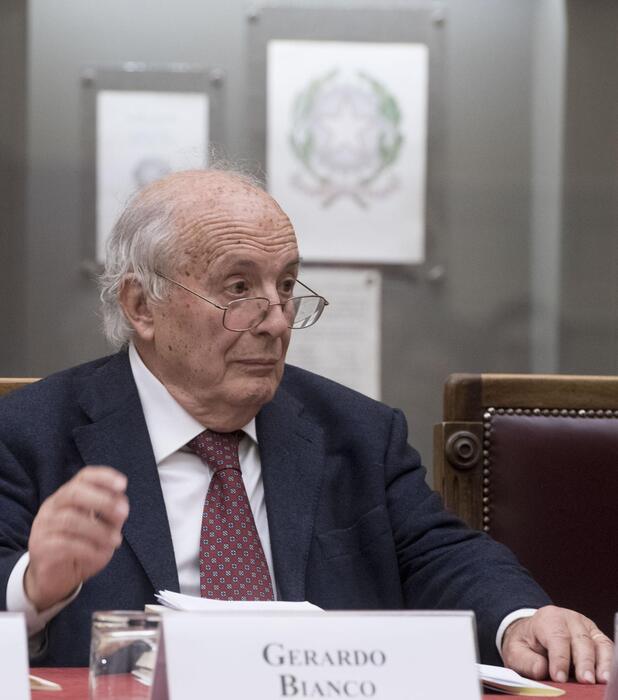Gerardo Bianco, historical exponent of the Christian Democrats, died this morning in Rome.
He was born in Guardia Lombardi, in the province of Avellino, on 12 September 1931. He graduated in classical literature at the University of Parma, later becoming a university professor of history of the Latin language and Latin literature at the faculty of literature and philosophy of the University of Parma.
In his youth he was active in the Catholic university federation, the Fuci.
He was a deputy from 1968 to 2008 in 9 legislatures, 7 of which from 1968 to 1994 with the Christian Democrats.
Initially close to the current of the DC "Base", made up mainly of Avellino citizens and led by Fiorentino Sullo first and Ciriaco De Mita later, he moved away in 1978 to approach the one led by Carlo Donat-Cattin first and Franco Marini later.
Group leader in Montecitorio of the DC during the VIII legislature, from 1979 to 1983. Vice-President of the Chamber from 1987 until 1990, when he became Minister of Public Education (until March 1991) in the sixth Andreotti government.
From 1992 to 1994 he again chaired the DC group in the Chamber.
Character of undisputed morality, he has always been considered in the parliamentary environment a man of culture lent to politics.
In 1994, following the end of the DC, and essentially of what has been defined as the first republic, following the Mani Pulite investigation, he joined the new Popular Party (PPI) of Mino Martinazzoli and was elected MEP in Strasbourg.
In 1995 he took sides against the right turn of Rocco Buttiglione, who in the meantime had become secretary.
Thus Bianco gathered around him a part of the center and all of the left of the party, obtaining the rejection of the secretary's decision by the national assembly.
The rift between the two souls of the party, led by Buttiglione and Bianco, never healed again, so much so that they participated separately in the regional elections: the wing of the party faithful to the social conservative line presented the common lists with Forza Italia and CCD in all 15 regions called to vote, under the name of "Forza Italia - il Polo Popolare", while the Christian social region led by Bianco presented itself with its own lists (in Tuscany and Lazio together with the Pact of Democrats) allied with the centre-left (except in the Marches and Campania where he supported his own candidates for the presidency of the On 24 June 1995,
following months and months of legal disputes, an agreement was finally reached between the two components headed by Buttiglione and Bianco in the PPI: they would separate, where Bianco's retains the name of the party (Partito Popolare Italiano) while that di Buttiglione kept the historical symbol (the Crusader shield), with which in July he gave life to the United Christian Democrats.
Bianco led the party for three years, contributing in a decisive way to the birth of the Ulivo and to the arrival of the Roman Catholic Prodi at Palazzo Chigi.
After those general elections in 1996, in January 1997 he left the secretariat of the PPI and was appointed president of the party, a position he held until October 2, 1999. In the general elections of 2001, he ran again for the Chamber,
and was re-elected deputy in the Campania 1 constituency. He was director of the newspaper Il Popolo, the official organ of the Christian Democrats first and then of the Italian People's Party.
In 2002 he is one of the main representatives of the movement against the continuation of political activity within Francesco Rutelli's La Margherita.
In November 2004, together with the parliamentarians Alberto Monticone and Lino Duilio, he founded the Italia Popolare - Movimento per l'Europa movement, which, although not a party, aims to restore an autonomous organized presence to democratic Catholics in Italy so as not to disperse and keep alive the ideological soul that was the PPI.
In the general elections of 2006 he was re-elected to the Chamber in the list of the Olive tree (La Margherita with the Democrats of the Left by Piero Fassino),
to then communicate to the chambers (on 15 February 2008) not to join the PD and to switch to the mixed group.
Subsequently, with his Italia Popolare movement, and together with Savino Pezzotta and Bruno Tabacci, he gave life to the centrist project of the Rosa for Italy, a party free from the poles and of Catholic inspiration.
Always a great scholar, Latinist, considered a great southerner, he was also co-director of the Horace Encyclopedia at the Institute of the Italian Encyclopedia.

